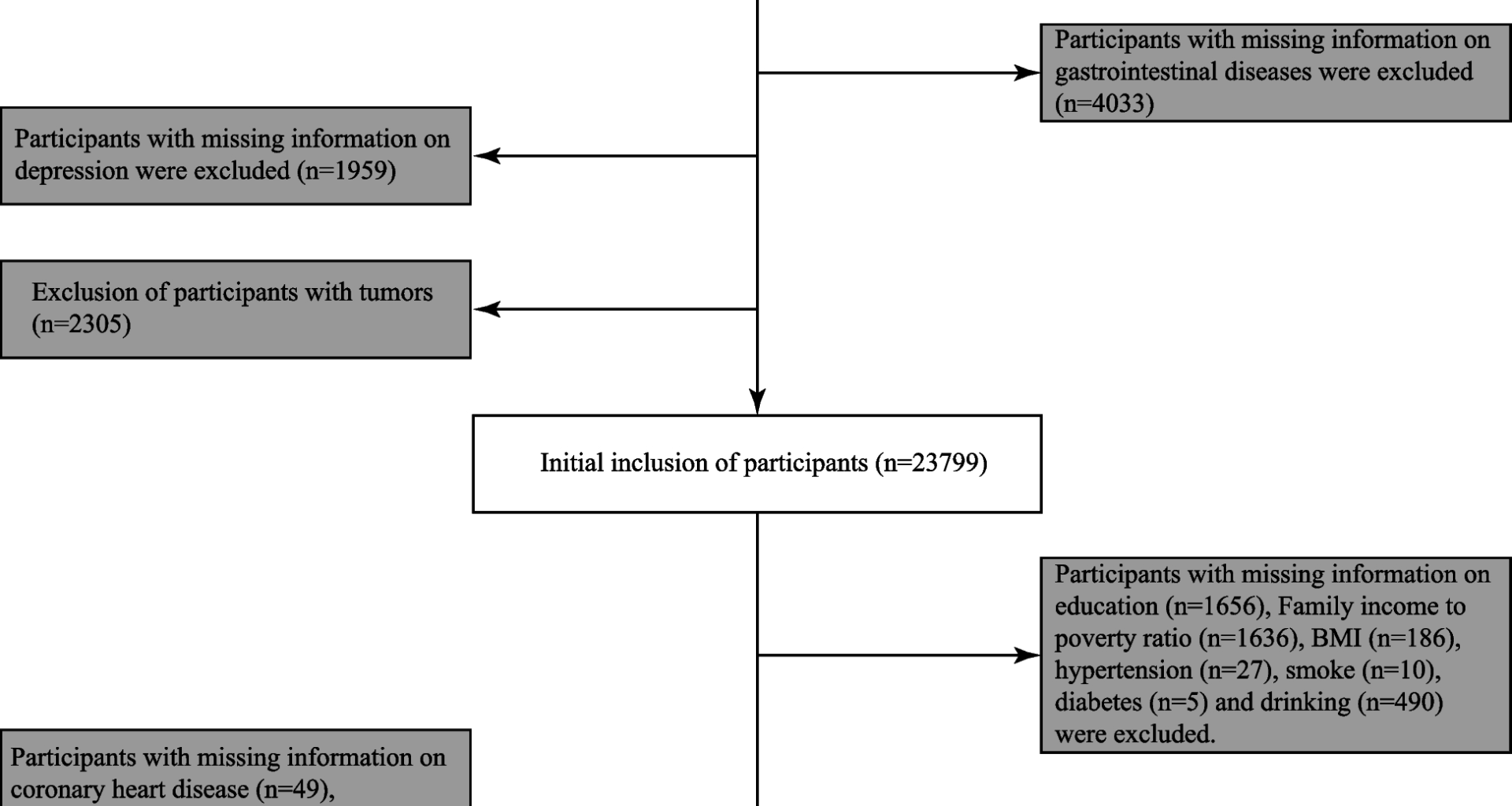The present study discovered that, among U.S. adults aged ≥ 20 years, there was a significant relationship between GI diseases and a heightened probability of experiencing sleep disturbances (adjusted OR = 1.70, 95% CI: 1.41–2.05, P P P = 0.038). These findings suggest that individuals with GI conditions are more likely to experience disrupted sleep patterns and shorter sleep times. Depression was identified as a partial mediator in these relationships.
These results align with growing evidence supporting a bidirectional relationship between GI diseases, sleep disturbances, and depression, potentially mediated by the microbiota–gut–brain axis. Recent studies have highlighted the role of gut microbiota in influencing sleep and mood via neuroendocrine, immune, and metabolic pathways. For instance, a 2024 systematic review by Galie et al. identified shared microbial biomarkers in both sleep disorders and metabolic syndrome, suggesting that gut dysbiosis associated with GI disease may disrupt sleep through altered microbial metabolites [22]. Likewise, Negi al. demonstrated that dietary components—such as fiber and polyphenols—enhance the production of sleep-regulating compounds like serotonin and melatonin, reinforcing the concept of chrononutrition in sleep regulation [23].
The neuro–immune–endocrine axis is also critical. Systemic inflammation, common in many GI diseases, is characterized by elevated levels of pro-inflammatory cytokines such as tumor necrosis factor(TNF), interleukin-1(IL-1), and interleukin-6(IL-6), which have been linked to sleep disturbances [24]. Khanijow et al. documented increased cytokine levels in patients with GERD and IBD, providing a plausible biological explanation for the observed sleep impairments [7]. Additionally, evidence from chrononutrition research suggests that GI-related circadian misalignment—caused by disrupted gut function or irregular meal timing—may further exacerbate sleep issues [25].
Depression was selected as a mediator due to its high comorbidity with both gastrointestinal (GI) diseases and sleep disorders. Biologically, depression can influence GI function via the gut–brain axis, particularly through the vagus nerve and the hypothalamic–pituitary–adrenal(HPA) axis, both of which regulate stress responses and gastrointestinal motility [13]. Psychologically, chronic GI symptoms—such as abdominal pain and bloating—may lead to emotional distress, exacerbate depressive symptoms, and subsequently disrupt sleep [10]. Serotonin, a key neurotransmitter predominantly synthesized in the gut, has been implicated in both depression and sleep regulation [26]. In our mediation analysis, depression accounted for approximately 30% of the observed association between GI disease and sleep disturbance, suggesting it plays a significant but not exclusive mediating role.
Beyond depression, other mechanisms may contribute to the GI–sleep association, including systemic inflammation, visceral hypersensitivity, and metabolic dysregulation. Inflammation is a well-established pathway, evidence suggests that sleep deprivation increases pro-inflammatory cytokine levels, creating a feedback loop that sustains both sleep and GI disturbances [24]. Visceral hypersensitivity—frequently observed in functional GI disorders such as IBS—can amplify pain perception and impair sleep quality [27]. Metabolic impairments, such as altered nutrient absorption in GI diseases, may also disrupt the synthesis of sleep-regulating hormones like melatonin [28]. Together, these biological pathways underscore the complex interplay underlying the GI–sleep relationship.
Although our findings are broadly consistent with existing literature, discrepancies remain regarding the strength and directionality of associations between GI disorders and sleep outcomes. For example, Ballou et al. found variable associations between constipation and depression severity, suggesting that different GI symptoms may have distinct effects on psychological health and sleep quality [10]. Such inconsistencies may stem from differences in study populations, methodological approaches or the specific GI conditions examined. Additionally, some studies adjusting for socioeconomic and lifestyle factors have reported attenuated associations, indicating that contextual variables may modulate these relationships [29, 30]. Further sources of variability include unmeasured confounders, inconsistent definitions of sleep disorders, and the inherent limitations of cross-sectional designs in establishing causality. Although our use of the nationally representative NHANES dataset enhances generalizability, further research is needed to resolve these inconsistencies.
The persistent association between GI diseases and sleep disturbances among individuals with CHD and higher DI-GM scores suggests that comorbid conditions and gut-related factors may modulate this relationship. CHD is characterized by chronic systemic inflammation, including elevated levels of C-reactive protein and IL-6, which may amplify the inflammatory effects of GI diseases on sleep physiology [31, 32]. Patients with CHD frequently have other comorbidities such as obesity and diabetes, both independently associated with GI dysfunction and sleep disruption, potentially creating synergistic adverse effects [7] This cumulative inflammatory and disease burden likely contributes to the stronger associations observed in this subgroup.
Interestingly, higher DI-GM scores—typically indicative of a healthier gut microbiome—did not mitigate the association between GI disease and sleep disturbances. This suggests that even with favorable microbiota composition, pathological processes such as visceral hypersensitivity or chronic low-grade inflammation may override the potential benefits [33]. Normally, a healthy gut microbiome supports the synthesis of sleep-modulating compounds, such as short-chain fatty acids and serotonin [23]. However, the presence of GI disease, with its associated pain, dysmotility, and psychological stress, may negate these benefits, resulting in persistent sleep problems [27]. These findings highlight the multifactorial and bidirectional nature of the gut–sleep axis and support the need for integrated interventions addressing both microbiome health and GI pathology.
